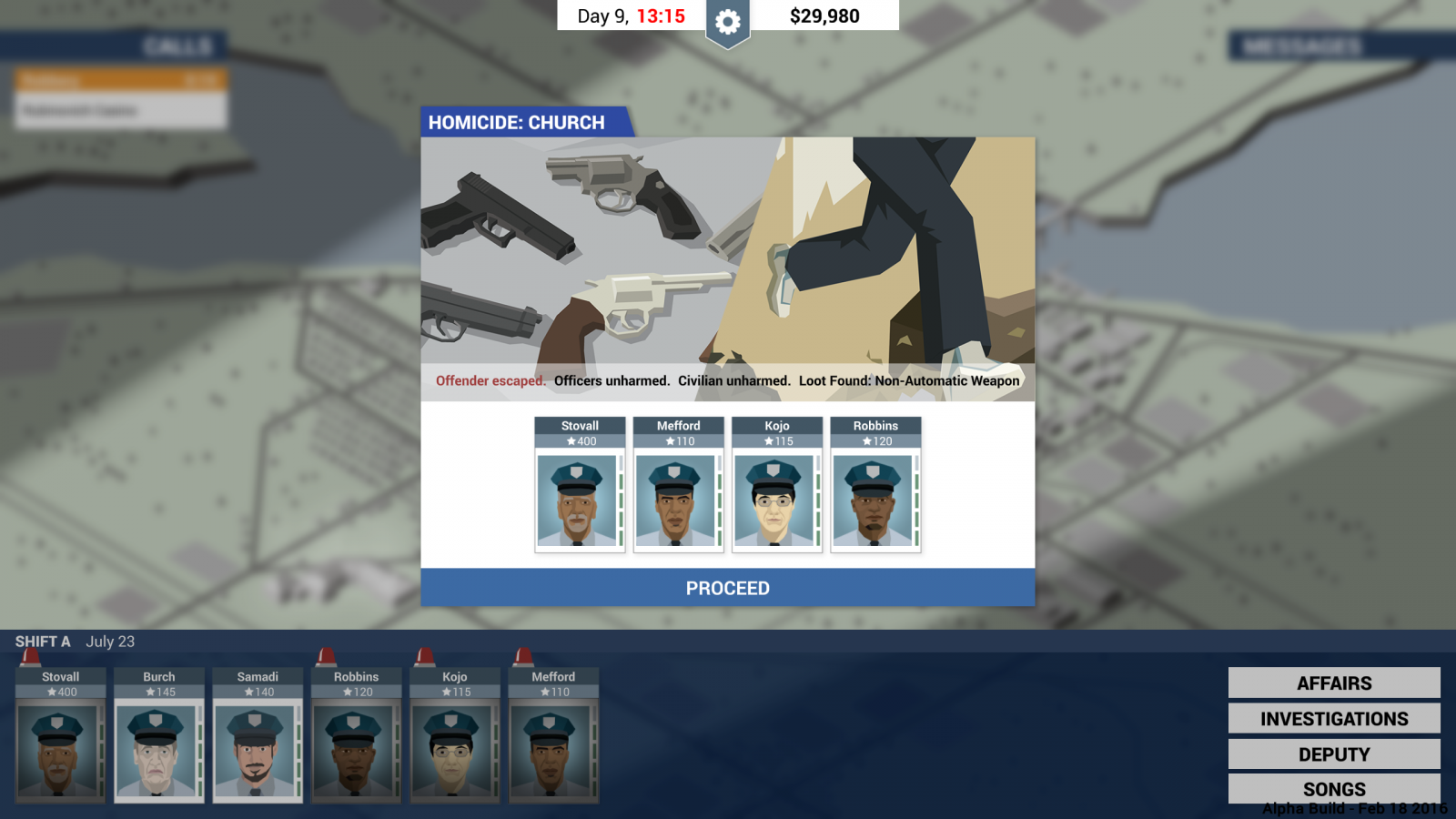This Is The Police review: A disappointingly shallow depiction of US law enforcement
As the state of US policing comes under increasingly intense scrutiny, Weappy's This Is The Police offers a disappointingly tame depiction
This Is The Police
Platforms: PC (tested), Mac
Developer: Weappy Studio
Publisher: EuroVideo Medien
Release Date: 28 July
Where to Buy
On its surface, This Is The Police simulates the bureaucracy of a modern, American police service. As chief, you must balance your department's budget, manage your officers and detectives and assign them either to the day's routine dispatch calls or longer, ongoing investigations.
A noise complaint or car theft will demand two patrolmen. A murder case will require a lead and secondary detective, plus a pair of uniformed officers to make the arrest. Dividing the department's work load is simple: as crimes are reported, you choose an appropriate respondent based on experience and rank and drag and drop them onto the case.
The game gradually introduces caveats (seemingly procedural calls can turn ugly, forcing you to deploy reinforcing officers and SWAT teams) but This Is The Police, largely, makes law enforcement appear straightforward. Every bit the video game, it is clear, consistent and functional.
608 people have been killed by US police officers in 2016 so far, 59 of them just this month. On the day of writing, a funeral is being held for Montrell Jackson, one of three police officers shot in Baton Rouge, Louisiana, during a protest over the killing of Alton Sterling. Sterling was shot in the chest multiple times after being restrained by BRPD officers whom believed he was carrying a gun.
Stricter laws? Harsher sentences? More arrests? Through a failed war on drugs, and all too successful war against its own black underclass, America has exposed how straightforward policing creates a more criminal city.
Kevin Ott from Oklahoma can be sentenced to life in prison for possession of just three and a half ounces of methamphetamine. The United States may hold the highest prisoner population on Earth, but since 1990, drug purity has increased while cost has gone down. America's hand-washing approach to law enforcement, reflected in the aphoristic 'Just Say No' campaign, has led not only to more crimes and so more criminals, but a police force both terrified of its own constituents, and prepared to execute them at the smallest perceived provocation.
This Is The Police's central auspicious principle – for a better chance of success, apply more officers to more dispatch calls – is tacit endorsement of the existing American project. The exact project which the game claims to, if not criticise, at least depict impartially.
Complications do variously arise in This Is The Police, but are rarely plausible. Alongside regular police work, you must accumulate your own pension fund and the quickest way to do so is by accepting bribes from your city's warring crime families. But the drama between them is hackneyed and turgid. The bosses of these two syndicates, the very notion of omnipotent crime families, with access to the chief of police, are larger than life.



Boyd, your character, speaks in hard boiled metaphors which would make even Max Payne cringe. Events that would be devastating to any real police department, the murder of an officer for example, are quickly passed over. Above any truths regarding actual police work, the game's hammy cop-show shtick takes precedence. In the cutscenes, following each day at the department, Boyd mediates not on bureaucracy, case work or anything the player has actually enacted, but his ex-wife, his drinking troubles and the Mafia. "In the movies, the villains controlling the city play golf with the judges," says Boyd of the Mayor. "He plays tennis with them instead. That's about the only difference." One needn't have seen The Wire to understand This Is The Police is a depleted take on the American inner-city.
On the game's Kickstarter page, Ilya Yanovich, development lead, claims This Is The Police is not about the United States and that the problems it discusses "are not political in nature." On the game's website however, it is described as a "controversial tale of...political intrigue"; the game's voice actors, particularly Jon St. Jon – whose name appears repeatedly in press materials – are American. Even the name: This Is The Police, implies factuality and insight.
Patently, the game is trading on real tragedies. And even if such trading weren't boasted (and then clumsily denied) any video game involving a metropolitan police service, released this summer, is automatically in conversation with current affairs. In light of its struggling narrative, Yanovich's claims feel like an attempt to re-frame This Is The Police as an asinine management simulation. One can only sympathise with his apprehensions.
Accessible and routine, This Is The Police is simultaneously a rich video game and a poor depiction of its subject matter. Whether the game's creators welcome it or not, at times like these, when police officers in the US are under intense scrutiny, This Is the Police's representation of their work bears similarly close examination. By that measure it falls short of relevance and borders on removed.
For all the latest video game news follow us on Twitter @IBTGamesUK
© Copyright IBTimes 2025. All rights reserved.




















